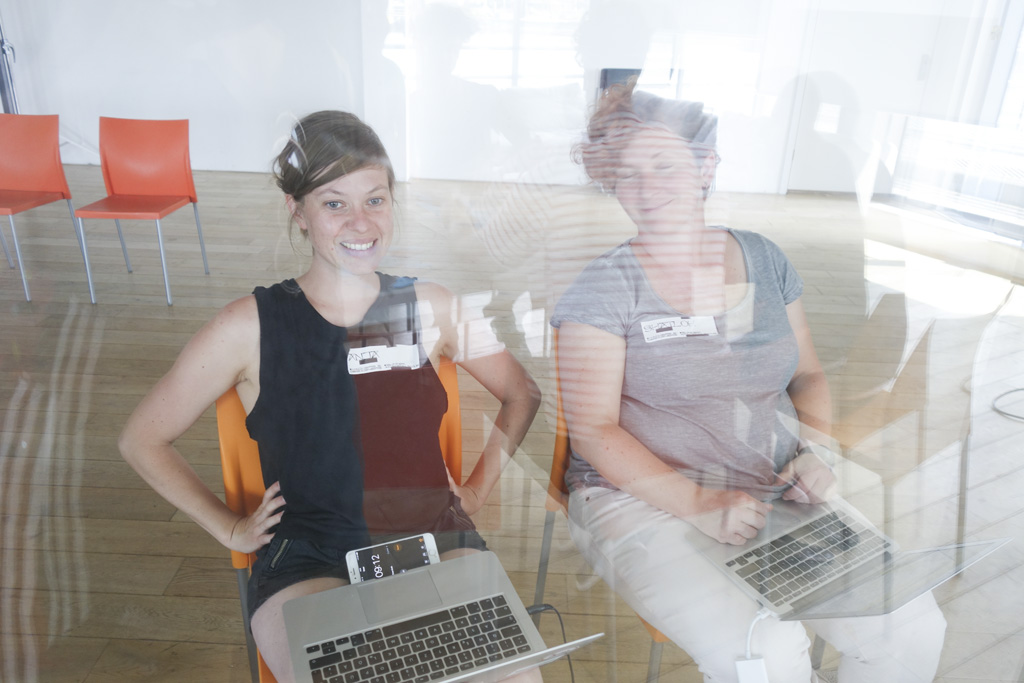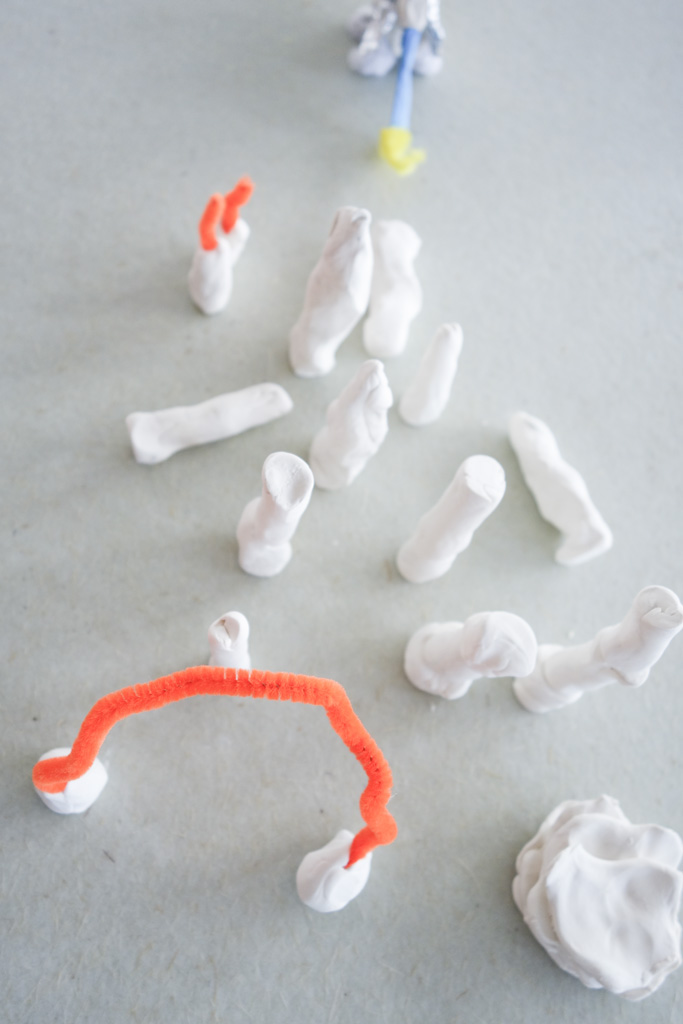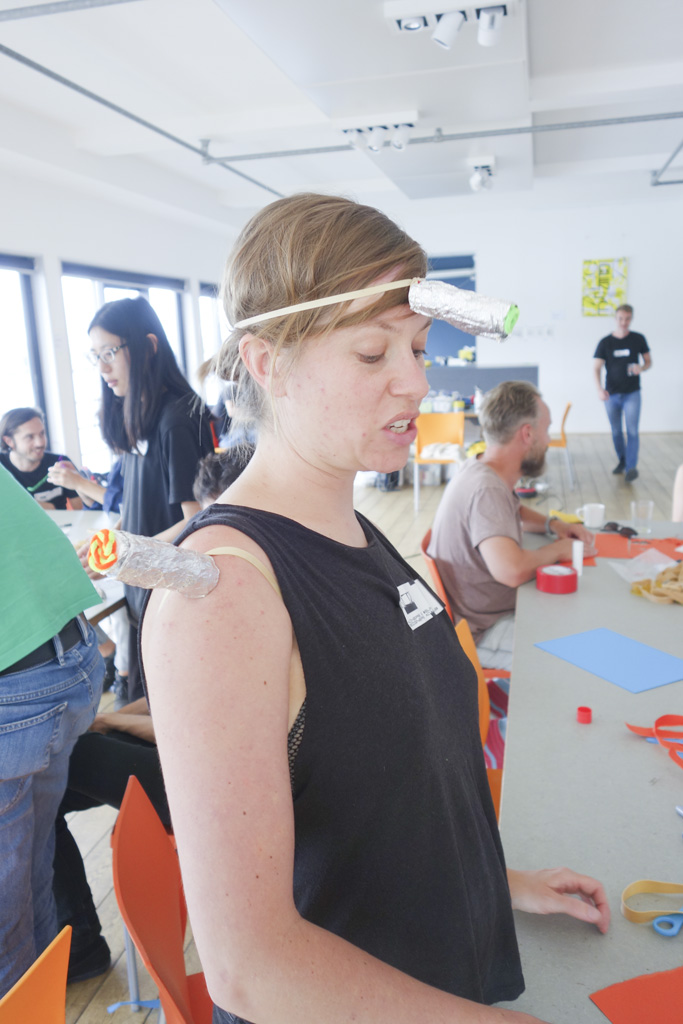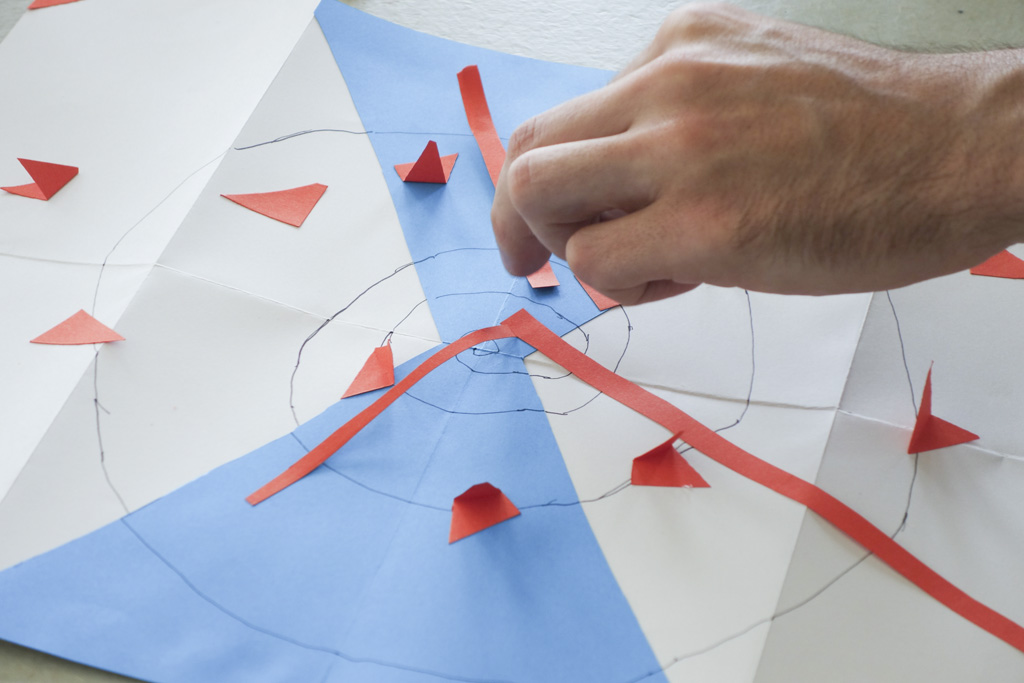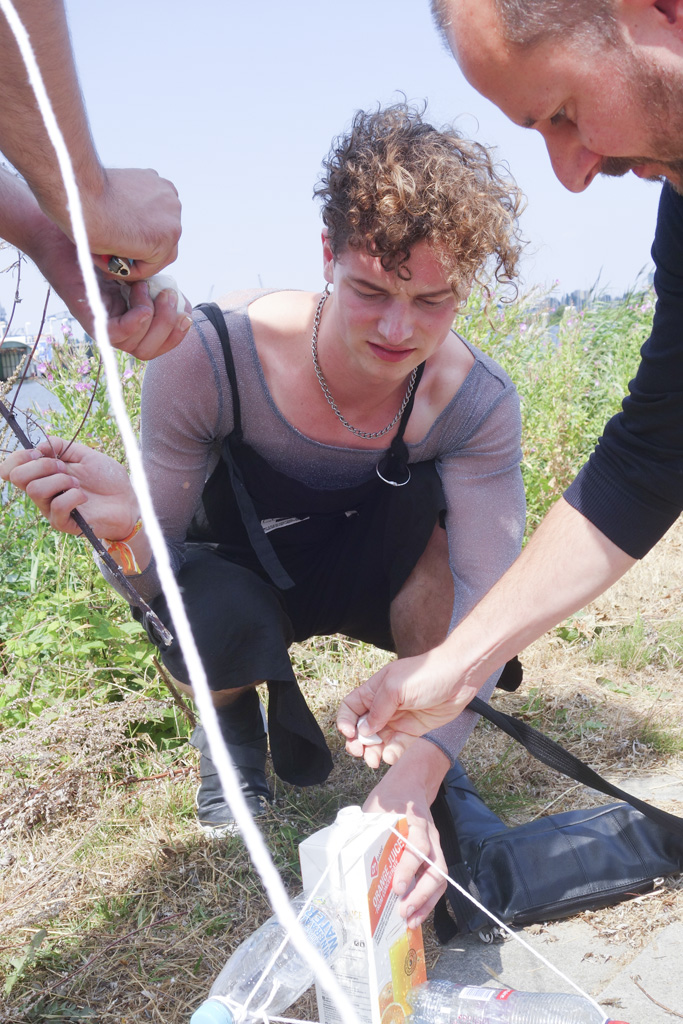Work the Workshop
| Work the Workshop | |
|---|---|
| Name | Work the Workshop |
| Location | De Bonte Zwaan |
| Date | 2018/07/21 |
| Time | 13:00-16:30 |
| PeopleOrganisations | Shailoh Phillips, Anja Groten |
| Type | HDSA2018 |
| Web | Yes |
| No | |
Schedule
Before the workshop
11.30 Welcome HDSA2018 by Juliette
11.45 Intervention by Selby
12.15 Lunch
The workshop
13.00 The Automatic Workshop
13.45 Phantasmatic Workshop Props
14.30 Coffee break
14.45 Workshop Simulation
15.15 Learning & Unlearning, presentation by Shailoh Phillips
15.30 Discussion
After the workshop
16.30 Moving to Fanfare (dinner on your own)
18.00 doors open
18.30 program starts

ACT I = Non human
The Automated Workshop
Can a workshop be conducted ‘automatically’, that is, scripted in advance and executed without a human facilitator? The Automated Workshop is an experiment in developing rules, conditions, variables for a 'successful' workshop. Exercising the idea of a workshop being programmable, this experiment utilises technical concepts such as containers, wrapping, nesting, sequencing, if-then statements, debugging, as well as deliberate use of randomness and contingency. The premise of The Automated Workshop its applicability to a multiplicity of contexts.
- Form groups of 3
- Sketch out 1 workshop case (drawing from own experience)
- Script 'pseudo-code' for an ultimate workshop* using the provided worksheets
* Pseudocode is an informal illustration of the operating principle of a computer program or other algorithm. It uses the structural conventions of a normal programming language, but is intended for human reading rather than machine reading. See also: https://en.wikipedia.org/wiki/Pseudocode
Phantasmatic Workshop Props – Countering the sticky-note
During Workshop Props participants are invited to reimagine workshop props as mediators, agents and attendants of workshop situations. By questioning convenient means such as sticky-notes, markers, whiteboards, and also the projector, we will be speculating about material forms and their implication and how would they influence our imagination. The imaginary tools may be speculative or serve real functions. There will be materials available for prototyping. Prototypes can be also renderings or digital collages
- In groups of 3
- Gathering of prototype materials
- Prototyping
- Demonstration of usage + video capture

ACT II = humans automating the workshop
Exercise: The Workshop Simulation
As a group, we will go through all the motions of the workshop, but condensed to high speed. This is an experimental rapid prototyping method for workshopping. We would practice a 2 hour workshop by running through all the steps in only 2 minutes. A full day workshop would last about 8 minutes. The aim of this exercise is to get tangible feedback on the choreography, and experience how the composition of steps works. What is the balance between instruction and experimentation? If and how can people collaborate? It will hopefully also make people think about ways to arrange the space to invite optimal collaboration. It will possibly also generate some new ideas about how to tweak the design of the workshop.
––––––––––––––––––––––––––––––––––––––––––––––––––
Notes
<eplite src="https://etherpad.hackersanddesigners.nl/p/" id="workshop-works" />
How to make a workshop work?
This workshop is geared towards sharing knowledge and expertise on what makes a workshop work — without it becoming a cookie cutter formula.
Who is this for?
artists, designers, hackers and technology people who would like to give a workshop. Now there are a lot of things going on under the title “workshop” that have some, but not all of the characteristics of a working workshop. When does a workshop work? When do the participants learn something new. When do they learn not only ‘about’ it, but are actively involved with it.
What level do we assume?
A mixed group, where some people have lots of experience giving workshops, most people have a little, some people have none at all, and everybody knows what it’s like to participate in a workshop.
What is NOT a workshop?
- a lecture or presentation (although it might include one)
- an exhibition or show (although it might start in one or result in one)
- a class or a course (although a workshop might be part of a class, for example a guest workshop)
- a reading or discussion group (although it might be nice complement to it)
- a group therapy session (although sensitivity to the group dynamics and emotional issues is important)
What is a workshop?
- an arrangement of people, materials, tools and knowledge in spacetime in such a way that knowledge flows between them.
- is repeatable, but not reproducible (the outcome is always a different, because it depends on the participants).
- is usually lead by a human, but can also work as a video tutorial or instructable (with step by step instructions for everybody to follow - although it might include this).
- offers a setting where people learn by doing (usually live action, with people in the same room - but can be distributed across time and space)
- workshop is active (you do / make things)
- a workshop participatory (everybody can do things)
- a workshop is semi-structured (the workshop leader prepares materials in advance, but not every step is set in stone)
- a workshop is interactive (there is room for initiative from participants to ask questions and engage in dialogue)
- provides room for constructive feedback
- takes place within a set timeframe
An inventory
- a safe social environment without pressure to perform, where failure is accepted and where differences are acknowledged and taken into account.
- the exercises are doable for the participants in the given time-
- clear communication before during and after about what will happen
- balance between constraints and freedom (there is a clear frame what is expected, but the frame is flexible enough to be modified)
- the activities fit the level of skills and interest of the participants (it is interesting, but not too difficult, the zone of proximal development)
- participants are challenged to do something new or in a way they have not done before
- peer-to-peer learning (the workshop leader doesn’t have the sole authority) at the same time should ensure the workshop doesn’t get hijacked by the same people
- room for experiment: people can try things for themselves, and practice at their own pace.
- the workshop is well prepared (everything is available, if possible, figure out who will be in your workshop in advance so you can tweak the content to their needs, make sure there is a clear description so that people know what they are signing up for)
THE WORKSHOP ITSELF: A partial list of building blocks
- Introduce yourself and your work/ First Impressions
- The first 5 minutes of a workshop, most people are trying to figure out what they have gotten themselves into. Are the people okay? What will they we be doing? Why are we doing this? Can I trust it? Will I be able to keep up? Bear in mind that the first 5 minutes sets the tone and willingness to participate.
- Ice breaker: if the group already knows each other, try an exercise that they are not familiar with. If the group starts trusting each other, they will learn more. This can also help people get in a mindset of experimentation, and discover things for themselves
- ELEMENTS: Framing / Demo / Explanation / Presentation / Assignment
- Make sure people know WHY you think this this is important.
Resources
Pedagogy of The Oppressed, Paulo Freire
In short, Pedagogy of the Oppressed is education as a practice of freedom, which Freire contrasts with education as a practice of domination
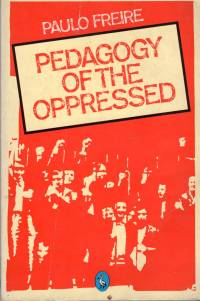
The Phantom of Liberty. Contemporary Art and the Pedagogical Paradox, Tone Hansen, Lars Bang Larsen (Eds.)
A publication that critically inquires the (im)possibilities of education within the fields of art and design. Can we teach art and design? What are pedagogical paradoxes and means of control within the neoliberal reality of art academies today?
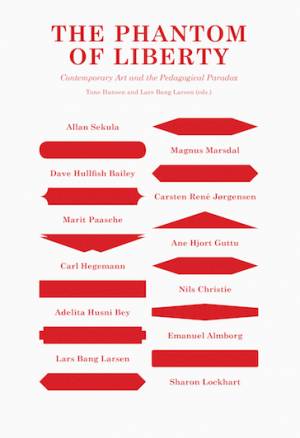
Contestations: Learning From Critical Experiments in Education, vd Putte, Ivision
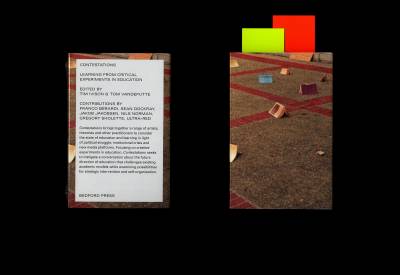
‘Art Education: A Glossary’ is a compilation of texts, edited with the students participating in the theory programme that Tom van der Putte convened in 2013 at the Studio of Immediate Spaces at the Sandberg Institute in Amsterdam.
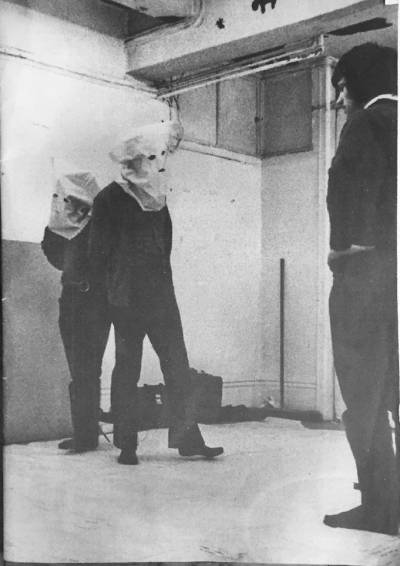
Design Education: Learning, Teaching and Researching Through Design, Philippa Lyon
Design Pedagogy: Developments in Art and Design Education, Mike Tovey
Studio Teaching in Higher Education: Selected Design Cases, Elizabeth Boling, Richard A. Schwier, Colin M. Gray, Kennon M. Smith, Katy Campbell (2016)
The Routledge International Handbook of Learning, Peter Jarvis, Mary Watts
The Routledge International Handbook of Higher Education, Malcolm Tight, Ka Ho Mok, Jeroen Huisman, Christopher Morphew
The Future of Technology Education: Contemporary Issues in Technology Education, P John Williams, Alister Jones, Cathy Buntting (2014)
Situated Design Methods, Jesper Simonsen, Connie Svabo, Sara Malou Strandvad, Kristine Samson, Morten Hertzum, Ole Erik Hansen
Design Anthropology; Theory and Practice, Wendy Gunn, Ton Otto, Rachel Charlotte Smith (2013)
Design Studies: A Reader, Hazel Clark, David Brody
Contestational Design. Innovation for Political Activism, Tad Hirsch, (PhD diss.,) Massachusetts Institute of Technology, 2008.
Educating the Reflective Practitioner, Donald Schön (San Francisco, London: Jossey-Bass Publishers, 1988).
Critical Making, in Open Design Now, Matt Ratto, http://opendesignnow.org/index.html%3Fp=434.html.
Issue-oriented hackathons as material participation, James Lodator and Carl. Di Salvo (New Media & Society, 2016).
Designing engineers, � Louis Bucciarelli, (Cambridge, Mass.: MIT Press, 1994), pp. 2-12. in Design Studies A Reader, ed. Hazel Clark and David Brody (London, New York: Bloomsbury, 2009), p 81.
DasArts Feedback Method:
A Film About Feedback Documentary / 2013 / 55 min / 16:9 / English
A documentary featuring the innovating Feedback Method developed by DasArts in collaboration with the philosopher Karim Benammar. This unique method allows a whole new attitude toward professional group working through giving and receiving feedback on each other works in process, while expanding the edge boundaries of the process of learning.
Published in Fake it! Fake them! Fake you! Fake us! Publication in 2019
